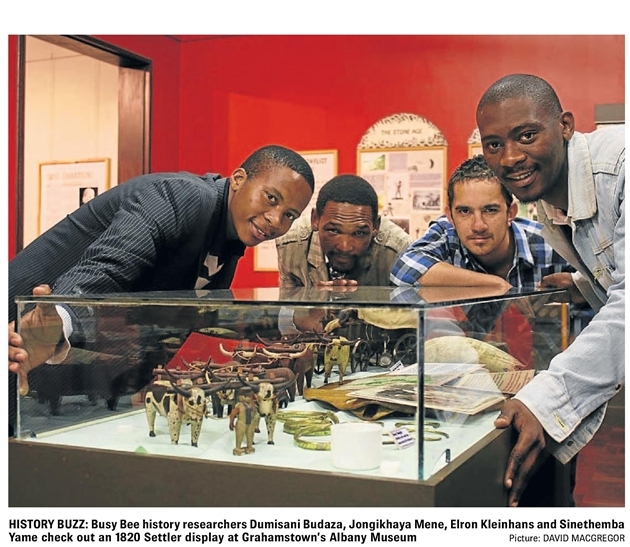
AN AMBITIOUS plan to send four Grahamstown university graduates into local townships to painstakingly collect the almost forgotten history of people of colour in the City of Saints is creating a buzz.
Even though they are earning a small stipend for their groundbreaking research, the excited young academics yesterday told the Dispatch working on the Busy Bee project, started by Makana Municipality and the Albany Museum to celebrate the establishment of Grahamstown 200 years ago, is still a dream come true.
After years of doing temporary work in diverse fields like IT, human resources and advertising, 27-year-old Rhodes University anthropology honours graduate Elron Kleinhans is counting the days until he hits the dusty streets of Joza next month to start collecting the black oral history of a town that was built on suspicion and conflict.
"I am finally working in my field and I can't wait to start interviewing people and hearing their stories," Kleinhans said. "It is important we get these untold stories out before they disappear forever."
The energetic, four-person research team — which is busy identifying themes to investigate - is a diverse mix of young Grahamstown-born academics keen to collect the untold stories of their home town.
The rest of the team comprises social science graduates Dumisani Budaza, 25, and Sinethemba Yame, 22, and fine arts graduate Jongikhaya Mene, 35.
Themes that will be investigated include a warts-and-all history of the people of Fingo Village -who were given land rights in Grahamstown by the British Empire as a reward for helping fight in the Frontier Wars - and the origins of their neighbours in the nearby Hottentot settlement. Forced removals, the Black Consciousness movement, black rugby, township schools, churches and liberation activists from King Makana to Siphiwo Mazwayi will also be researched.
According to Budaza and Yame a key component of the research is to reconcile and unite Grahamstown. "It is not about the money - we want to do something we love and give something back to the community,"
Budaza said. Albany Museum manager Bongani Mgijima yesterday said the Busy Bee project was designed to get communities involved in collecting their own histories.
"History is not only important for today - it is important for future generations." Makana councillor and history professor Julie Wells, who has been driving the project, said Busy Bees started after it became clear a good deal of Grahamstown's history had never been recorded.
"The project is designed to help share technological skills as mini-histories can be very cheaply produced in electronic formatting, combining old photos, text, voices and music.
"People can feel a sense of pride in telling the stories of their achievements, whether it be schools, churches, sports groups, neighbourhood associations, stokvels or groups of workers."
She said an aim of the project was to help achieve a greater balance and fuller picture of the area's rich and diverse history.
"Part of the concept is to generate an interest in 'social history' which includes much of what we might call the ordinary stuff of everyday life, looking at things like eating habits, recreation, rites of passage, cultural expressions and customs.
"Such stories can be told by anyone and everyone. "It is not about being rich or famous, just about how we lived in days gone by. "Everyone from any walk of life can make a contribution."
DAVID MACGREGOR
DAILY DISPATCH 19 Apr 2012
